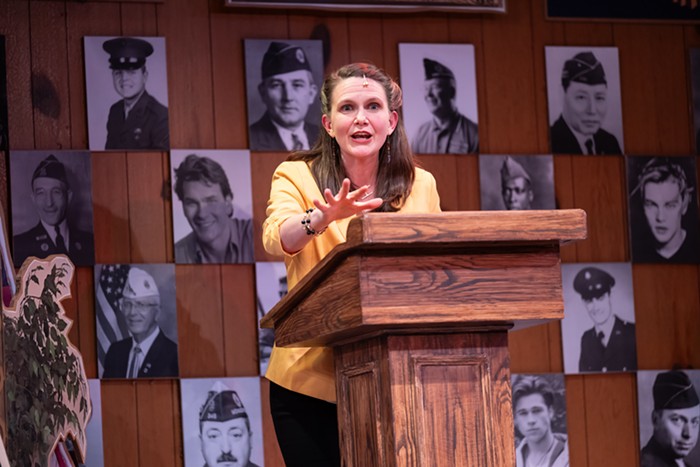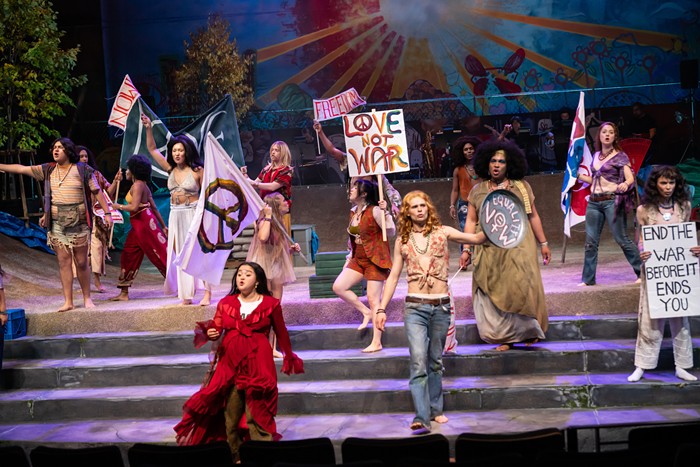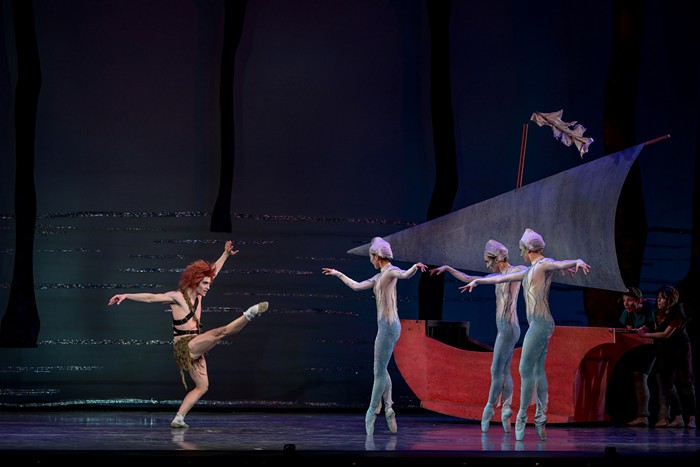BAD REPUTATION PRODUCTIONS is taking over this town. After Road House: The Play! and The Lost Boys—Live!, producer Shelley McLendon can seemingly do whatever she wants and see a successful run of sold-out shows.
In the spirit of the season, McLendon has now turned her adapting pen to the 1964 Rankin/Bass stop-motion animated Christmas special Rudolph the Red-Nosed Reindeer. Opening as the weather turned cold and the season's first snow fell, Rudolph—On Stage! is both timely and timeless.
Somewhere between timely and timeless is where McLendon's adaptations always fall. Rudolph, like Road House and The Lost Boys, is a product of its era—the production values are as wobbly and unfinished as the cultural values it purports to extol (misfits and outcasts may one day save the day, but only then will they be accepted)—yet Rudolph is aired every year, to this day. McLendon's take captures the lasting sweetness of Rudolph, including just enough camp to entertain, without pushing the boundaries of taste or reverence.
Of course, mounting a stop-motion animated Christmas special on stage with live performers is inherently funny. McLendon especially plays up the animated nature of the characters she performs, Rudolph's love interest Clarice and a misfit toy called Charlie-in-the-Box. Brad Fortier shows a similar attention to the busted frame-rate of cheap animation in his role as the Bumble, the abominable snow monster of the north. Jed Arkley's Rudolph is a largely faithful representation of the old Rudolph—those hoping to hear "It's not very comfortable" and "She said I'm cuuuuute!" won't be disappointed. And yet Arkley gets some of the biggest laughs of the show, like when he makes no effort to hide that he has to reach into his back pocket every time he lights up his nose.
Conceits like those make Rudolph—On Stage! a blast. The cast is small, each member playing various characters, each character requiring a new funny voice. For the most part, it means that you'll see people like Michael Fetters play three distinct characters, each funnier than the last (his Yukon Cornelius is admirably off-the-wall).
The one complaint I have about this tiny cast is that Tony Marcellino, who plays the wildly different characters of Hermey, misfit elf and aspiring dentist, and a skinny, prickly Santa Claus, never gets a chance to be in a scene with himself. As Hermey, his chemistry with Arkley is perfectly warm and odd, and their musical number—a West Side Story-influenced scene of musical badass-ness—is a show-stealer of a number. But it's as Santa that Marcellino offers the production one of its moments of high camp, poking fun at just what an asshole Santa really is for most of this story: misfit toys are banished, elves that don't make toys are disciplined, mutant reindeer are ostracized and excluded. The problems in the North Pole are institutional, and can be traced back to this grump of a leader.
The star of the show, however, is Wm. Steven Humphrey's Sam the Snowman. To be more specific, it's the bottom third of his costume. (If I had to guess, I'd say 60-70 percent of the production budget went into this costume.) Humphrey, finest actor of his or any generation and—totally unrelated—editor of this very newspaper and signer of my checks, commits wholly to the children's storyteller role of his character (although the Cesar Romero-style painted-white facial hair is decidedly creepy, Steve), but is rendered unbearably funny by the bulbous, pendant third snowball that hides his feet and swings in a frankly over-sexy way for a snowman.
We already knew McLendon as a master of nostalgia for the adult and teen flicks of bygone times. With Rudolph, she proves that she can handle our childhood nostalgia—anyone's childhood nostalgia, since the original Rudolph has been on air for almost 50 years—with equal reverence and wit. She's also proven that we can't predict what she'll do next, but we can trust it will be a whole lot of fun.




















